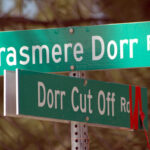Home »

A good novel that cuts close to real life
Book Review
By Derryll White
 ARNOLD, Elliott (1948). Everybody Slept Here.
ARNOLD, Elliott (1948). Everybody Slept Here.
First, there is the excitement of holding one of the old Signet New American Library volumes. I remember these from when I was a teenager; yellow band on the cover above and below a (what seemed to be, then) lurid cover picture. They were everywhere with titles such as ‘Strange Fruit’, ‘All the Girls We Loved’ and ‘Devil In the Flesh’. I can’t remember if they were any good but that is what there was once you broke out of the confines of the school library.
All I know about Elliott Arnold (1912-1980) is that he was an American newspaperman born in New York City. He drifted around wartime (WW II) Washington D.C. According to one newspaper review “His bitterness is not only deeply felt and well expressed, but it is effective to the extent that it makes one loathe the thought of another war if these pentagon people are going to run it again.” Well, that hasn’t changed much in 70 years.
‘Everybody Slept Here’ was the tenth of 26 novels that Arnold wrote, with his most famous being ‘Broken Arrow’, which was turned into a movie (1950) and then a TV series (1956). He enlisted after Pearl Harbor and entered the Army Air Corps, discharged after four years with the rank of Captain. ‘Flight from Ashiya’ was also turned into a movie in 1964.
As a writer Arnold is very good at building characters. He has taken the craziness of war, the uncertainty and feelings of “anything goes” and used that to analyze a number of relationships he has fabricated. Throwing in lots of liquor, some politics and a questionable sense of morality, he lets the reader examine the post-war era in the light of what has just passed. He talks very intelligently about the need we all have to need someone, to have someone with which to share, intimately.
The story cuts pretty close to real life and has some surprisingly touching moments where the female characters poke at some vulnerable social spots. There is a consistent question of ‘who owns me? Do I own me?” playing between female and male characters which still hasn’t been addressed socially today. And the portrayal of the military bureaucracy still rings true all these years later. I was happy to run across this novel in a Bookcrossings display rack in a Portuguese castle. It made me think about what we have accomplished as a society since 1948.
****
PENTAGON BUREAUCRACY – The Pentagon Building maintained an elaborate service for placing attached officers and their wives. A large section of one of the remoter parts of the building was given over to a stunningly designed office with a major in charge, two captains assisting and a second lieutenant to get coffee four times a day for his superiors, plus half a dozen attractive women whose husbands were officers, in the Pentagon or overseas. This office required each applicant for an apartment to fill out a questionnaire which was incredible in its length and exhaustive queries, even by Army standards. The officers, who managed to wear colorful line of ribbons although none of them had been closer to danger than the murderous street traffic in Washington, were charming. The young ladies were even more charming. But the office, in some miraculous manner, was able to maintain an almost unbroken record of unsuccess.
AN UNDERSTANDING MAN – One of the things Nancy understood in Brent, and it was something she adored in him, was that when they left the party he wouldn’t say, “What was the matter with that MacGregor woman, she doesn’t look like a tramp?” He accepted things like that, she thought, holding his hand very tight, almost as though he expected people to loop off on tangents, as though nothing were normal except the departure from the normal.
POLITICS – When the war started we stuck air bases everywhere we could, and lots of places we shouldn’t. They had to be put in different places for different reasons: reasons of supply, climate, availability, and, and this is important, the demands of the gentlemen in Congress. An air base means a business boom and all the boys wanted to take care of their own.
TEMPERATURE – When a man and a woman wake up in bed in the morning and look out the window and it’s snowing and soft and muffled out and they feel the alien and pressing strength of nature, they turn to each other and get close and give each other an animal comfort. It’s a kind of joining against the cold. Their house becomes more than just a building. It becomes a protection for them – the walls, the roof, everything combining to keep out the terror of the cold. And at this time, according to my theory, a man and a woman become in a simple way closer to each other than any man and woman living where it is always warm can ever hope to get. In a warm climate it seems to me that nature conspires to make people turn away from each other, to turn outward, to the softness and ease. Cold weather turns people toward each other, inward. They seem to need each other in an ancient way.
 – Derryll White once wrote books but now chooses to read and write about them. When not reading he writes history for the web at www.basininstitute.org.
– Derryll White once wrote books but now chooses to read and write about them. When not reading he writes history for the web at www.basininstitute.org.








